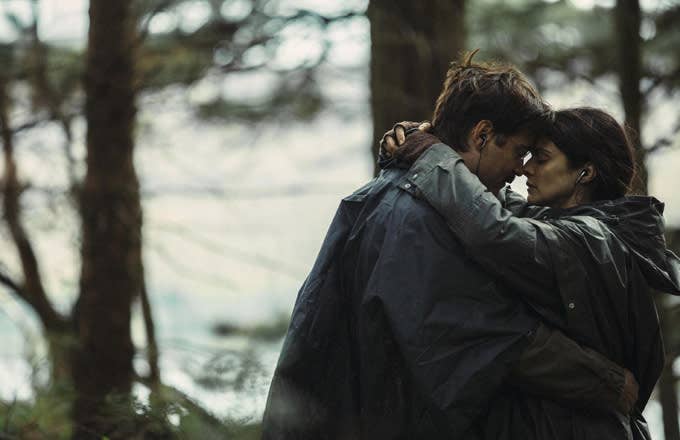
I got ghosted again.
I had been talking to a dude from whichever dating app didn’t currently seem as abjectly terrible as the rest for almost a month. He’d disappear, then text, disappear, and then text again. So it’s not particularly surprising that when we finally made plans to meet he flaked without a word.
As I get older, and my social media timelines continue to become oversaturated with engagements, weddings, and babies, it’s increasingly harder to not feel incredibly anxious about being single or even worse, resign myself to a future where I clearly made my choice.
The relative ease of technology and the bevy of choices that it has offered has created a dating dystopia of sorts. It’s a buffet of options, carefully curated by users, devoid of initial chemistry, and even easier to just float back into the app void without accountability. Even though it’s stripped of technology’s flash, Yorgos Lanthimos’ The Lobster—the weirdest romantic drama of late—hits so close to home. In The Lobster's universe, single people are given 45 days in a singles resort to find a mate or be turned into the animal of your choosing. Colin Farrell stars as David, whose wife has recently left him, so he’s forced to find a partner (his animal of choosing is a lobster, hence the title). He comes with his brother (turned into a dog, years prior) and befriends a man with a lisp (John C. Reilly) and one with a limp (Ben Whishaw), and the trio engage in the resort’s various activities.
While it’s increasingly clear that the resort is cloaking major darkness (Punishment for masturbating! A heartless woman! Suicides! People hunting!), The Lobster is bitingly sharp about the way it pinpoints our ways of latching onto arbitrary traits or morphing ourselves to find the “right” partner. While David is doing this as a means of survival to not be turned into his animal of choice (a lobster, of course), it’s easy to reflect on the things that I’ve done to convince myself about my chemistry with another person. “Oh, he likes Carol.” “He’s nice to you.” Or even darker, shaped myself into a less demanding, less complicated, sweeter person for someone who would ideally want me without putting on those airs. Seeing a mutual Facebook like on an app or overhearing someone mention Drake at a bar piques interest, perhaps even tricking you into thinking about a future with someone that doesn't exist. But those commonalities are what gets things started.
Whishaw’s Limping Man begins to give himself nosebleeds to court Nosebleed Woman. David eventually shapes himself into a heartless shell to woo the Heartless Woman, impressing her by ignoring her fake choking and allowing her to "die." These elements that make The Lobster bleak yet relatable are the same that make it darkly comedic, as we watch Whishaw continually slam his face into a number of objects to make his nose gush blood or David stiffly dancing with the Heartless Woman. Even though they’re fucked up, the ways these characters strain to connect to other people at the resort (even under these extreme circumstances) have more than a nugget of truth at their core. It’s like watching an endlessly awkward first date dialed up to 10. But true connection isn’t solely built on mutual nosebleeds or a detached willingness to watch someone die, and keeping those artifices up is never viable especially if its just to ward off loneliness.

The Lobster balances its dystopian outlook by introducing us to society's rebels, called The Loners, the single people who have gone rogue in this couple-mandated world to maintain their singleness. They’re led by a fierce, unfeeling leader (Lea Seydoux) and live in a not-so-idyllic forest commune. After things at the singles hotel go awry, David joins The Loners, and it really is the lesser of two evils, but just barely. As a plus, David can masturbate again, but the rules in the forest contain their own horrors: digging one’s own grave, outlawing sex (or any romantic gesture) amongst the group, and being outrightly hunted. As the cliché sentiment about finding someone when you aren’t looking for it goes, David meets a Short-Sighted Woman (Rachel Weisz) amongst the motley single group and the pair embark on a forbidden, fraught romance. With this setup, it’s easy to immediately poke holes in the legitimacy of their pairing. Like all forbidden romance, it’s filled with long looks, hidden signals and unbearable tension. Even though their passion for one another isn’t clearly as manufactured as David’s relationship with the Heartless Woman, it begins as just another version from the singles resort. They bond over their shortsightedness, he claims sole ownership of catching her rabbits to eat and eventually a first kiss happens during a synchronized music listening sesh. But under the intense watch of The Loners, once those commonalities are taken away, their footing becomes uneven and it’s harder to tell how they were drawn together in the first place. It's hard to not read it as just another means of survival for David and another surface level connection that can be casually tossed away.
Perhaps I’ve grown much too cynical with ghosting and the wishy washy dating landscape, but I've taken the open ending of The Lobster (which is quite brilliant) to feed all my worst anxieties and instincts of what I expect from relationships nowadays. David’s uncertainty about the Shortsighted Woman at the end of the film is palpably familiar in both the times I’ve tried to make something wrong work and simultaneously when I’ve realized I’ve become too vulnerable with someone who’ll never return the sentiment. The long buried romantic in me wants to believe that the connection between David and the Shortsighted Woman is real, but mostly I don’t think any of us can be trusted with our own hearts or do what’s best for us. But maybe you'll read it another way. Maybe that’s what makes The Lobster the movie about love we deserve right now—it can read as bleak or as hopeful as we want it to.

